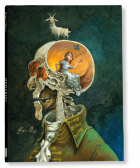RALEIGH SIR WALTER
 Sir Walter Raleigh (1552?-1618)
Sir Walter Raleigh (1552?-1618)
Explorer, statesman, admiral, historian, and poet, son of Walter Raleigh, from Fardel, Devonshire, was born in Hayes Barton. In 1568 he was sent to Oxford, where he greatly distinguished himself. The following year he started off his career in France as a volunteer in aid of the Huguenots, serving in the Low Countries. During 1579 he set out to his first voyage of adventures with his half-brother, Sir Humphrey Gilbert. Their chief purpose was to discover lands in North America; yet the expedition failed, mostly due to the opposition of the Spaniards. In 1584 he fitted out a new colonising expedition to North America, and succeeded in occupying Virginia, named after the Queen. On his way back he was knighted. In the dark and anxious days of the Armada, 1587-88, Raleigh strove to organise resistance, rendering a distinguished service. His favour with the Queen, and his haughty bearing, had, however, been raising up enemies and rivals; besides, his intrigue and private marriage with Elizabeth Throckmorton, one of the maids of honour, occured in 1593, made him lose the favour of the Queen for a while. Away from the Court, he returned to the schemes of adventure and, enthusiastic of the Spanish accounts of the fabulous wealth of Guiana, he, along with a group of friends fitted out an expedition which, unfortunetely, proved unsuccessful.
Once regained the favour of the Queen, in 1596, Raleigh was appointed an Admiral in the expeditions to Cadiz, and in the following year engaged in an attack against the Azores. The death of Elizabeth in 1603 was the turning point in Raleigh’s fortunes. From then on, disaster clouded his days. As a matter of fact, the new sovereign and his old enemies tried to compass his ruin. Accused of conspiration, he was sentenced to death and imprisoned into the Tower.
During this confinement he produced his History of the World. It is one of the finest specimens of Elizabethan prose, reflective in content and grave in style. Released in 1615, he set out on his last voyage, once again to Guiana, which, like the former, proved a complete failure since he lost his eldest son.
Displaying a noble presence, he was gifted with a commanding intellect and a versatility which enabled him to shine in every enterprise he set himself to. In addition to his great fragment, the History of the World, he wrote A Report of the Truth of the Fight about the Azores, and The Discoverie of the Empire of Guiana, together with a number of poems chiefly on philosophic matters; among these, the best known are The Pilgrimage, and that beginning “Go, Soul, the Body’s Guest.”
From Biographical Dictionary of English Literature - the Everyman Edition of 1910
links: - Sir Walter Raleigh as an explorer - Sir Walter Raleigh home page - Sir Walter Raleigh Collection at The North Carolina University (U.S.A.) |






